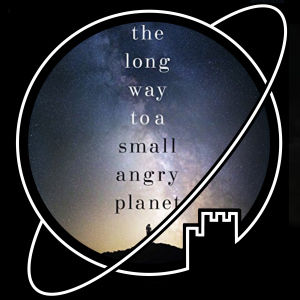- Novel written by Arthur C. Clarke
- Published in 1951
- Standalone


Listened to the audiobook with Greg Wagland – good narrator.
There is always something fascinating about reading science fiction from before some of humanity’s milestones in space exploration. It has not even been a century, but there is such a gulf separating especially the details of imagined and real life. With science fiction this old, you can laugh at all things the authors got wrong, and marvel at the things they got right.
In The Sands of Mars, I was actually rather surprised at how much thought Clarke seemed to have put into the colonisation of Mars; my experience with 1950’s science fiction is that whiIe it may be well thought-out, it doesn’t generally care about accuracy. The Sands of Mars is different: I would label it ‘hard science fiction’, or at least, a 1950’s attempt at hard science fiction.
Having said that, there is a lot in The Sands of Mars that is patently ridiculous to the modern reader, such as thriving vegetation on Mars, print newspapers in the village-size colony, or the fact that all women on Mars appear to be secretaries(?). But it is exactly these kinds of ‘misses’ that make you appreciate the ‘hits’ all the more: if Clarke was writing from such a different society and with so little knowledge, then each time he got it right is pretty impressive.
Still, if you’re looking for a slightly more recent (though the 1990’s aren’t exactly modern either) novel on the colonisation of Mars which fits more closely with our current understanding of the physics, I would rather recommend Kim Stanley Robinson’s Red Mars instead.
Back to The Sands of Mars – it’s fascinating for it’s historical vantage and in the history of sci-fi, but is it any good as a novel?
I rather liked Clarke’s playful twist of writing the novel from the perspective sci-fi writer Martin Gibson who gets invited to describe the Mars colony, who actually gets to experience that disconnect between what he wrote and predicted with reality – it gives the novel a nice ‘meta’ feel without feeling forced.
Besides that clever premise, I think the plot is really nothing special – it has the typical 1950s style of mostly taking place in armchairs and behind office desks, with the added drawback of Gibson never quite taking charge of the goings on. Gibson is a wonderful fish-out-of-water that other characters can explain the details of spaceflight and living on Mars to, but he is trailing the plot basically all the way to its resolution (perhaps with one exception where he entirely accidentally stumbles upon a relevant development).
On the other hand, I think Gibson comes to life quite well for a protagonist in an early sci-fi novel – he seems quite a bit more complete than most 1950’s British gentleman-heroes.
In the end, I think the combination of a multidimensional main character and the interesting 1950s vantage make The Sands of Mars well worth reading – though always realise that you’re traveling back in time some three quarters of a century as much as you travel into an imagined future.















